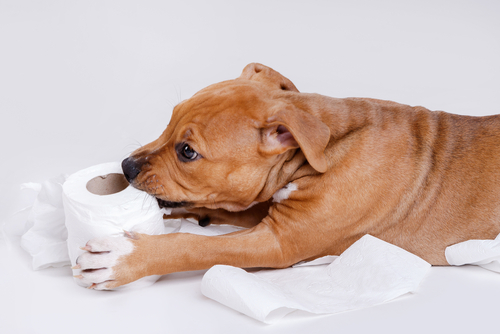Puppies often exhibit what we consider to be annoying behaviors, many of which are frequently mishandled, even by the most well-meaning dog owners. Understanding what motivates dogs to behave as they do is an ideal foundation from which to build a healthy relationship and training dynamic with your puppy. When obedience training begins early, is consistently maintained, and is accompanied by habits to maintain your dog’s optimal well-being, eliminating undesirable puppy behaviors will be much easier.
Please remember that negative behavior must be redirected or corrected immediately, and positive behavior must be rewarded or reinforced immediately. Your dog will never connect correction or rewards that take place more than a few seconds after their behavior occurs.
Chewing
Chewing is a natural and healthy activity for your dog. Still, when your puppy is chewing your shoes, furniture, and dangerous electrical cords, it is clear that this healthy activity needs to be redirected. Your puppy may be chewing due to teething, anxiety, boredom, lack of exercise, or desire to explore their world. Your puppy doesn’t have hands with which he can grasp things, but just like a human baby, his first instinct is to put everything in his mouth.
Give your dog plenty of appropriate chew toys. A puppy should not be given hard chew toys, rawhide, or cooked bones. When you see your dog beginning to chew on an inappropriate item, make a sudden, sharp noise. Once your puppy looks up, give her one of her chew toys to replace it. As soon as she puts her mouth on the appropriate item, give her praise and a quick scratch or pat.
When you’re not able to watch your dog closely, confine her to her crate or puppy-proofed area.
While a young puppy should not be taken on super long walks, energetic play, time in the back yard, and short walks are all necessary components of providing your puppy with enough interaction to burn off excess energy.
Biting and Nipping
Your puppy will almost certainly attempt to bite and nip at you playfully, which is a behavior that must be corrected immediately. Never offer your hands, arms, or feet for your dog to chew or teethe on.
A mother dog will teach her puppies not to bite her, and she will discipline them quickly when they do. This, along with yelping feedback from its siblings, will provide your puppy with his first bite inhibition training. From there, it’s up to you to yelp in a high pitch and stop giving your puppy attention when he uses his mouth to interact with you.
Once he is settled, begin interacting with him again, providing an appropriate object for him to mouth and chew.
Eliminating Indoors
Potty training is one of the most infamous aspects of training a young puppy. Gone are the days when we smack, yell, or rub the puppy’s nose in her mess to show her that she’s made a mistake.
Instead, take your puppy outside after every meal and every hour or two throughout the day. After a nap, expect your puppy will need an opportunity to go outside and eliminate. When your puppy eliminates outdoors, praise her, and give her a small amount of a high-value treat.
If you see her beginning to eliminate indoors, quietly pick her up and carry her outside. Place her in an appropriate area, and give her the opportunity to eliminate.
If you don’t see your puppy eliminating and she manages to make a mess indoors, it’s too late to correct her. Next time, watch her more closely and take her outside more frequently. The mistake here is yours, not hers, so as frustrating as this situation may be at the moment, it’s vital that you not take your frustration out on her. If you do, she will only try to hide from you when she needs to eliminate, making it much more likely that she’ll have an accident indoors.
The Takeaway
This list only scratches the surface of the most common behaviors in puppies. For assistance with a specific issue, and to begin the socialization process that all puppies require, please schedule a training session here at All Dogs Unleashed.



